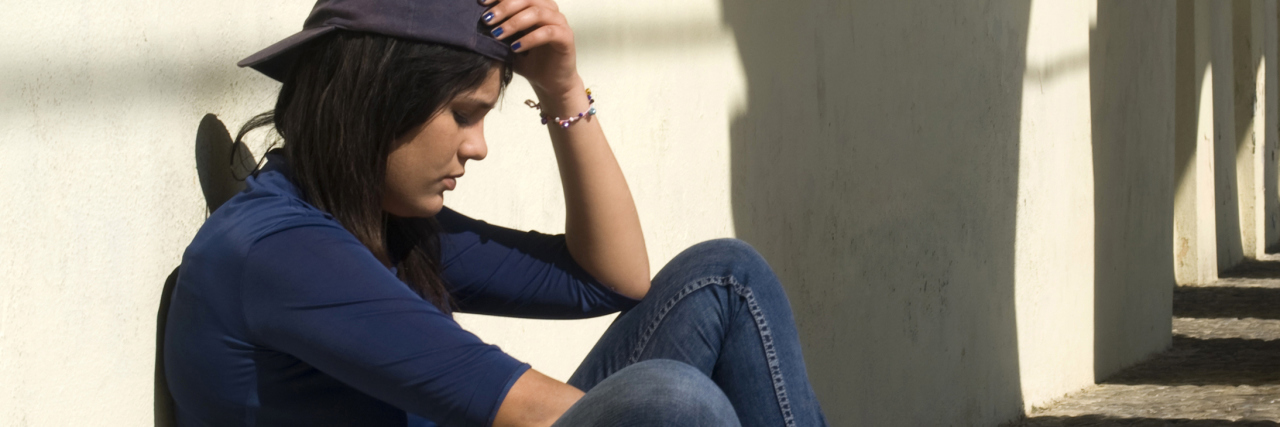Editor’s note: If you have experienced emotional abuse, the following post could be potentially triggering. You can contact the Crisis Text Line by texting “START” to 741-741.
Growing up, I always searched for resemblances with my mother. Those almond-shaped kohl-lined eyes with long eyelashes, straight eyebrows that framed them, narrow nose, and wide face carved at the chin with that natural indent below her cheekbones that I’d seen on my grandmother. It was no secret that my mother was beautiful. She had that healthy, plump, translucent fair skin, and the shiny wavy hair you see in shampoo commercials. She also had a welcoming laugh and a voice that carried across the room in a way that was unexpected for her petite 5’2 frame. People would recognize her voice before they would see her, the same voice I would look for in stores when I would get lost. She was so elegant, and yet always talking loudly. The life of the party.
Having parents from two different countries means they may not share the same ethnic features. And mine were no different. I would look in the mirror sometimes and see my little brown face, at the time narrow and long, dressed in a perpetual earnest and anxious expression. There was no mistaking I looked like my father. Curly-haired, with small almond eyes that slightly turned down at the edges and closed when I laughed. My father might have been the very definition of the strong, silent type. He was and is the most honest, upstanding person — warm, loving and slightly awkward in social situations, but never self-conscious of it. The best listener. We would start to fill his ears as soon as he would come home from work. My sister and I would wait at the door to take his bags and walk him to his room until we were talking through the crack in the door he was trying to gently close. It was the best part of my day.
People always thought my father looked so serious, with his furrowed curly brows and glasses that sat firmly on his long, slightly rounded rose. He mostly either looked indifferent to everything, or thoughtful. He didn’t smile all the time, but had an unexpectedly charming sense of humor. When his face would break into a chuckle, it was the most heartwarming, genuine, low rumbling laugh that would light up his eyes, reveal his teeth and shake throughout his body.
They didn’t always say we looked like him, but everyone always said that we didn’t look like her. My mother liked to joke that when I was born, my father was disappointed that I looked like him more than I looked like her. When I started wearing a headscarf at age 8, everyone questioned why I would want to do that, but it was simple to me. I just wanted to look more like her. I might have worn my headscarf off and on until I was 10, and then I did want to wear it for more than just that reason. But regardless, it was a special feeling to be both doing our scarves together in the mirror before we went out.
She said she would put kohl in my eyes when I was a toddler so that my eyes would look more like hers. I started wearing kohl in my eyes when I was about 13, blinking eagerly to witness some sort of transformation. I would look at pictures of myself, and pictures of her from both the past and the present, desperately searching for similarities. “Don’t I look like her in this picture?” I would ask my father and siblings.
“Do I look like her in this picture?” I ask my husband, standing outside the Manchester Old Trafford stadium. He looks at me kindly; “No,” he says reassuringly, “you don’t.” I look at myself in a picture on my phone; my features have changed as I’ve grown. Then I look at my now-wide face, carved at the chin, smiling with slight indents just below my cheekbones. My eyes, almost closed from smiling, turned up at the edges with eyeliner. My straight eyebrows framing my face, and my full lips stretched into a photo-ready smile. I swipe to another picture of me, standing with my in-laws, smiling. My face wide and slightly sharp at the chin, my cheeks slightly indented and my nose straight. I swipe again. This time I’m holding my baby nephew close to my cheek, my almond-shaped eyes looking to the side and my lips pursed to contain laughter. I look like her. But I wish I didn’t.
I look at myself in these pictures now and the face that looks back at me seems eerily similar to one I know so well — a smiling face that masked behind it turmoil, anger and anguish. Those shining eyes that could so quickly widen threateningly and go bloodshot. Those eyebrows daring us to speak. Those full lips, dangerously pressed together until they were white, or saying things I wish I could forget. That wide face with soft skin, contorted in an expression of hatred, rage, delusion. The lies. The violence. The days and weeks and months and years of crying tears into my carpet, pillow, hands, or wishing I could die to escape the irrational rage none of us could understand. The destruction of hearts and home. The years of feeling alone, devastated and confused.
I look at the picture of me now, my eyes scan it impatiently trying to find differences. I turn up to look at my husband who’s watching me. “You are not her,” he says softly. I look back at the picture and grip it tighter. I hope so.
If you or a loved one is affected by domestic violence or emotional abuse and need help, call The National Domestic Violence Hotline at 1-800-799-7233.
We want to hear your story. Become a Mighty contributor here.
Getty Images photo via SurkovDimitri

